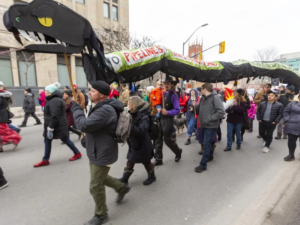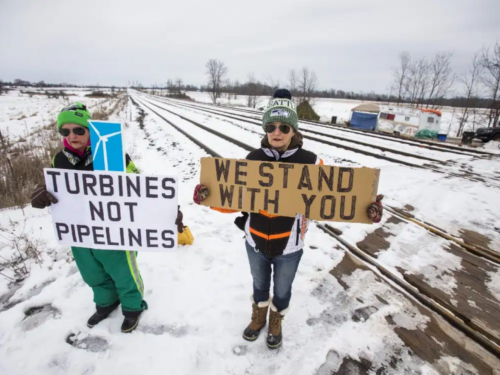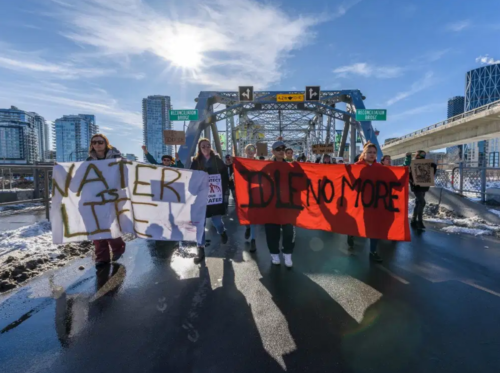
A large protest took over Dundas Street as it left Wellington went up Richmond then down Queens on the way to the RCMP offices on Talbot Street in London, Ont. A large snake representing a pipeline carries signs that the pipeline is not worth it in terms of health and pollution. They were protesting in solidarity with the Wet’suwet’en Nation who are blockading the Coastal GasLink pipeline in BC Photograph taken on Tuesday February 11, 2020. Mike Hensen/The London Free Press/Postmedia Network
Pipeline Protests Spread from Coast to Coast
But it’s the railway protests that have galvanized the most attention across the country
By Tyler Dawson, National Post, February 12, 2020
EDMONTON — As protests against a natural gas pipeline through the interior of British Columbia continued across the country on Wednesday, two Wet’suwet’en hereditary chiefs who oppose the project crossing their territory moved to get the federal courts to put an end to construction.
The challenge calls on the Federal Court to declare that Canada is constitutionally obliged to meet international climate change targets, which the chiefs contend would cancel approvals of the Coastal GasLink pipeline that runs from Dawson Creek to Kitimat on the northwestern B.C. coast.
“If Canada is allowed to continue approving infrastructure for fracked gas projects on a 40-year timeline, our territories will become a wasteland before the project licenses expire,” Chief Lho’imggin, who also goes by Alphonse Gagnon, said in a statement.
Efforts to resist the pipeline’s construction and the ouster of those who had occupied a remote forestry road in northern B.C. had sparked protests Wednesday from Halifax to Victoria. The protests continued to block passenger train and freight traffic in Ontario and B.C, leading to concerns that, if prolonged, the backlog will affect imports and exports at Canada’s sea ports.
Via Rail announced all trains on the Toronto-Ottawa-Montreal corridor would be cancelled until at least Thursday. And protests greeting politicians and blocking traffic have expanded to several Canadian cities.
Alberta Premier Jason Kenney warned the spreading unrest was a “dress rehearsal” for future pipeline projects, including the Trans Mountain Expansion, and called it “eco-colonialism.”
B.C. Premier John Horgan condemned the protests at the B.C. legislature on Tuesday that blocked access to the building as the government returned with a throne speech. Reports of assault and injuries prompted investigation by the Victoria police that were continuing Wednesday.
“I don’t want to live in a society where politicians direct police to take action against other citizens … that’s why we have courts,” said Horgan. “Law enforcement is in a very difficult position.”
Overnight Tuesday into Wednesday morning, protesters in downtown Vancouver camped out at an intersection, stalling traffic, before clearing out in the morning.
On Wednesday, hundreds marched the streets of Vancouver after rallying at the B.C. Supreme Court building, where lawyers were challenging an injunction that saw Vancouver and Delta police officers clear out blockades of ports in Vancouver and Delta. On Monday, police arrested 57 people while breaking up the blockades.

Local residents Angela Lammes (left) and Annette McIntosh show their support for the First Nations and anti-pipeline protestors at a rail crossing at Wyman Rd., south of Old Highway 2, east of Belleville, Ont. on Tuesday February 11, 2020. Ernest Doroszuk/Toronto Sun/Postmedia
In Halifax Deputy Prime Minister Chrystia Freeland, who was meeting with Nova Scotia Premier Stephen McNeil, faced some some two dozen protesters at One Government Place with banners that read “No pipelines. No colonial violence” and “#wetsuwetenstrong.”
At a brief media appearance, reports said she didn’t answer repeated queries about the protesters. Later, when she arrived at Halifax city hall to meet Mayor Mike Savage, she was again confronted by protesters who attempted to prevent her from entering the building.
Prime Minister Justin Trudeau, who’s travelling abroad trying to drum up support for a Canadian bid for a United Nations’ Security Council seat, said from Dakar, the capital of the west African country of Senegal, that he’s “encouraging all parties to dialogue,” and said he’d be having a call Wednesday with his cabinet to discuss what to do about the rail blockades.
In a statement, Marc Garneau, the Liberal transport minister, said court injunctions that CN Rail obtained late last week to clear out protesters “must be respected” but cautioned it wasn’t up to governments to order police how to proceed.
“The right to peaceful protest is a fundamental right in Canada, but individuals who choose to use this right must do so in accordance with the law,” Garneau’s statement said.
Another group of supporters took to the streets in Ottawa on Wednesday morning, moving from the office of the federal justice minister into a major intersection near the Supreme Court of Canada.
The crowd caused a traffic jam that backed up vehicles for blocks, but the delay was cleared in less than an hour as protesters dispersed.
But it’s the railway protests that have galvanized the most attention across the country.
In two locations, New Hazelton, B.C,. which is some 130 kilometres northeast of Terrance, B.C., and near Belleville, Ont., between Kingston and Toronto, protesters have halted rail traffic. CN Rail, which has been affected by the rail shutdowns, said on Tuesday the blockades were “harming (Canada’s) reputation as a stable and viable supply chain partner.”

Extinction Rebellion and Idle No More Calgary members gathered in downtown Calgary Monday, blocking off the Reconciliation Bridge and Memorial Drive in to support the Wet’suwet’en Nation in B.C. and their pipeline protest on Monday, February 10, 2020. Azin Ghaffari/Postmedia
Police in Ontario and British Columbia have served injunctions to protesters and said they were monitoring the situations.
Near Winnipeg, protesters moved to block yet another rail line. Premier Brian Pallister said the Justice Department will seek an injunction to end a rail blockade west of Winnipeg and have it enforced within a few days.
“As much as we will always respect the right of protesters to have a voice, they don’t have a veto and … they don’t have the right to put their rights ahead of everyone else and to disregard the laws of our province and country,” Pallister said.
Various politicians, including Conservative party leadership candidates Erin O’Toole and Peter MacKay, along with Kenney, have called on police to enforce the injunction.
As of press time Wednesday, police had not moved to enforce the injunction.
Police do have some discretion to enforce court orders in Canada, said University of Calgary law professor Lisa Silver.
“Often, police will use alternate means before creating a situation where force and violence can result,” Silver wrote in an email.
Since last week, the Royal Canadian Mounted Police has been clearing out the last of the supporters of the Wet’suwet’en hereditary chiefs, who were blocking access to the pipeline near Smithers, B.C. By Tuesday afternoon, RCMP said they’d wrapped up operations in the area.
The project, the $6.6-billion Coastal GasLink pipeline, destined to carry natural gas, runs from the Dawson Creek, B.C. area to Kitimat, B.C., on the northwestern coast of the province, across a 670 kilometre route.
Along the pipeline’s path, 20 elected band councils have signed agreements with Coastal GasLink Pipeline Ltd. — a subsidiary of TC Energy, formerly TransCanada Corporation. Several hereditary chiefs, who claim some 22,000 square kilometres of B.C. as their traditional territory, oppose the project.
With files from The Canadian Press and the Vancouver Sun
Canadian Town Evacuated After Another Oil Train Derails and Burns, by Justin Mikulka, DESMOG, February 6, 2020
In Their Own Words: What the #WetsuwetenStrong Allies are Fighting For, by Alex Ballingall ,Jenna Moon, Alex McKeen, The Star, Feb. 12, 2020
TYENDINAGA MOHAWK TERRITORY, ONT.—The reasons to take a stand don’t need to be explained. Here in Tyendinaga, at least for some, it goes without saying: The struggle of the Wet’suwet’en hereditary chiefs is the struggle facing everybody.
The plights of colonialism, stolen land, nature brutalized by a settler society hungry for money — these are the perceived links that bind the conflict over a natural gas pipeline in northern British Columbia with demonstrations of solidarity rippling across Canada.
“That is why we’re here, to protect our land,” said Debbie Clark, one of the few people who agreed to be interviewed by the Star at a small protest camp outside Marysville, Ont., on Wednesday.
I invoke Wakanataka, White Buffalo Calf Woman,
Chief Sitting Bull, Chief Cochise, Chief Red Cloud,
Chief White Cloud, Chief Joseph, Chief Geronimo,
Sanat Kumara, St. Germaine, the Mighty Ones, and
all the Universal Laws, the Divine Blessings, Virtues,
Qualities, the Dimensional Growth Patterns for Peace,
Love, Joy, elimination of bigotry, hatred, control, greed,
the insidious unconscious ways not of love within/without.


PLEASE JOIN 8@8
SENDING LOVE

